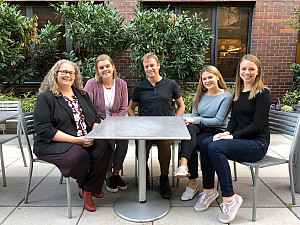MMC Makes Strides in Campus Sustainability Initiatives

Staff, faculty, and student members of the Environmental Sustainability SPIN Team
The team, originally convened by President Kerry Walk in the spring of 2019, is tasked with reviewing and evaluating the College’s existing sustainability goals, implementing new sustainability programs, maintaining communication with the College community on its work, and promoting classroom and campus-wide sustainability education programming. The group, with representation from students, faculty, staff, and administration, has met monthly since then to advance its agenda.
Thus far, the group has developed a webpage about MMC’s sustainability efforts, and led the charge for the College’s conversion from offsite to onsite sorting and recycling—a change that will take effect in the form of a pilot program in January 2020, as the MMC community notices the presence of new recycling receptacles on campus. Capital Project Manager Lucy Wells noted that it may take students, faculty, and staff a little while to get used to sorting, when they’ve grown accustomed to the sorting being done offsite, but that the payoff will be great: “Sorting recyclables ourselves reinforces the importance of each person taking responsibility for making us a more sustainable campus.”
Newest Initiatives
The College has collaborated with an energy and water management consulting company, Bright Power, to help advise MMC on the most efficient and environmentally friendly solutions; this partnership has produced several important results, including:
- Installation of a building management system (BMS) that electronically controls utilities like heating, electricity, and cooling. The College has already seen an impact on its utility usage and costs!
- Replacement of Carson Hall’s north-facing windows, improving energy efficiency;
- Use of organic, pesticide-free landscaping tools;
- Pilot for an on-site, self-sorting recycling program;
- Significant changes in dining services through Chartwells, including a waste-reduction program, more plant-based food options, and sustainable eating utensils; and
- Research projects through team member Matthew Lundquist, Ph.D., to identify, quantify, and improve the ecosystem services provided by the Lowerre Family Terrace.
100% Renewable Energy
In previous years, the College had purchased its energy from a variety of sources, yet only 40-50% from renewables like wind and water. With help from Bright Power, and through a company called Drift, MMC now purchases 100% of its power from renewable sources. Team member Madison Weisend ’20, a double major in Environmental Studies and Politics and Human Rights, says she’s proud to attend a college that is powered solely by renewable sources. “Few colleges and universities have achieved this remarkable goal,” she says. “In my four years of education here, I’ve witnessed a significant change in both students and faculty who are prioritizing environmental sustainability in their personal and professional lives. I’m looking forward to crafting a vision of MMC that continues to limit its energy use and incorporates sustainable thinking in every academic department.”
View MMC energy data, 2016-2019
Next Steps
While ESST celebrates the success of the College’s newest initiatives, there is of course more work to be done. If you have suggestions, ideas, or questions, please email Katie LeBesco, ESST Chair.
Thank you to the members of the Environmental Sustainability SPIN Team;
- Katie LeBesco, Ph.D., Associate Vice President for Strategic Initiatives
- Matthew J. Lundquist, Ph.D., Assistant Professor of Biology
- Lucy Wells, Capital Project Manager
- Julia Furnari ’20, Biology major and SGA Senator for Service and Sustainability
- Madison Weisend ’20, Environmental Studies and Politics and Human Rights double major
Published: December 13, 2019
